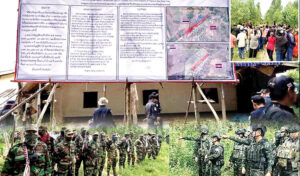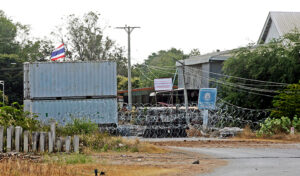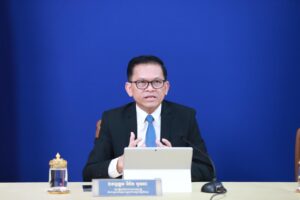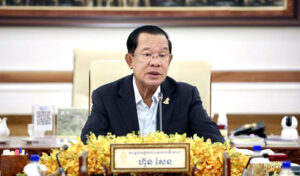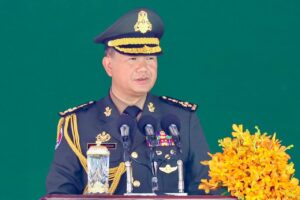(Video) Selected Comments of Samdech Thipadei Hun Manet, to the comments from the Joint Session of the National Assembly and the Senate on the implementation of the National Social Protection Program
Respected President of the Assembly
Your Excellencies, Ladies and Gentlemen,
Dear Members of the Assembly!
Allow me to respond to the comments made by Your Excellency and Lok Chumteav, on the Royal Government’s social protection system, and also the participated clarifications and details from the Royal Government’s technical and policy departments. Before handing over the platform to the technical departments to respond, I would like to thank Your Excellency and Lok Chumteav, who provided contributed elements, interest, and encouragement to the policy implementation, as well as providing elements related to some of the challenges that the implementation can be adjusted.
Governance principles, outreach, universal coverage, and service enhancement are the themes that were raised. In commenting on the delivery of this social protection policy, let me briefly highlight a few points. First, regarding governance. This work is at the core of policies, from the rectangular to the pentagonal strategy. Implementing this social protection policy is one of our core points.
(1) Governance focuses on institutions and mechanisms for implementation, budgets managements, and services delivery. Therefore, we have established three levels of mechanisms – political, regulatory, and operational, to play a role in reviewing, formulating policies, adjusting policies, and monitoring, evaluating, and reviewing the effectiveness of service delivery.
The Royal Government has tried to improve all of these things. We also recognize that nothing is perfect. Not every system can be responsive all the time. Even advanced countries need to make adjustments. In some countries, the social protection policy framework was very good 20 years ago, but now the cost and guarantees of the system are inadequate due to the rising cost of living and the changing nature of the beneficiaries. In many developed countries, the number of beneficiaries is increasing, as the definition of favoritism and benefits is becoming more and more burdensome for the Royal Government and those governments.
For Cambodia (2), expanding our reach is essential to enable citizens to receive more and better. However, we cannot keep up with every demand or requests. Ensuring sustainability is a responsibility. We cannot spend money or respond to demand quickly and run out of money in a year or two. In this regard, I would like to inform Samdech, Your Highness, Your Excellency, of the extension of our coverage.
We aim to expand universal health coverage, but this does not mean that 100% of our citizens are 100% covered by the state. This expansion of coverage means that citizens can be covered according to a particular form of formula. At the moment, we have two formulas – first, the social security system, which is based on contributions from employers, or the state for public employees, or the self-employed, which means voluntary contributions from targeted beneficiaries voluntarily. In this regard, the state has set up this mechanism and is involved in the contribution process to ensure treatment of some of our citizens who has the affordability.
The state gives the highest priority to the most disadvantaged citizens, the most difficult, for which we have launched a social assistance program, whereby the state provides 100% (coverage). We call it the Equity Card or the Poverty Card. These two cards and the National Social Security Card, are different. Just now, His Excellency Ith Samheng mentioned that it was easy for the informal economy to register with the authorities in the past, why do they now have to register with the Ministry of Industry, Science, Technology & Innovation (MISTI)? It is because of the new arrangements for them.
(3) If they only take the guaranteed protection through the equity card program, they do not need to register as an informal economy. However, if when they register in the informal economy, they can apply for the NSSC. This is the difference. Of course, this kind of arrangement has just started, and there is definitely not enough publicity. Therefore, the Ministry of Industry, Science, Technology and Innovation has worked hard to cooperate with local authorities to publicize it. I always remind local authorities, especially the governors of all capitals and provinces, to help publicize it widely.
Regarding these points, Your Excellency and Lok Chumteav, may have already received information that (4) in 2024 and 2025, we had spent and will be spending 800 million dollars for social assistance programs. These 800 million dollars is for programs that are paid 100% by the state. It is a lot. In this regard, we do not have the ability to expand the scope as requested. For example, as requested by Your Excellency and Lok Chumteav extend coverage to all Buddhist monks, which is more than 60,000, and more than 100,000 militia, we do not have that size of budget.
Even with the budget we have, as is raised by some of Excellencies and Lok Chumteav, for those who have already received it, the elderlies have received so little. This is an equation in which the government has to raise money on one hand during a time when the national economy is struggling by lowering taxes to help the private sector so that companies do not suffocate too much (on the other hand to increase spending in social protection program). We have given tax breaks even to the informal economy. We also give tax breaks to those who are not compliant so that they can cope up with difficulty. So, one hand goes into a small pocket (while the other hand has to cover) the larger expenses.
As for the scope of this governance, how much coverage is there and how to target it. This is an important task. The Royal Government also recognizes that the assessment of the ID Poor system, for example, is not perfect. We have the Ministry of Planning review and evaluate according to some set indicators. They are not accurate. Nothing is accurate because the factors are different. Sometimes, living conditions change. If we do not update regularly, we will (have insufficient information or) be wrong. For example, in Oddar Meanchey, some who had been registered as poor at the time of for assessment, five years later, have money to buy a tractor.
That was how thigs are changing. However, (5) we recognize that all work needs to be monitored and evaluated. That is why we have made adjustments. During the year 2000, we re-adjusted the application system. Those who have difficulties can apply to the authorities and the committee so that these two bodies can conduct their evaluation. In the evaluation, while they were really poor, but the committee evaluated them as not (in accordance with the set indicators), they could protest and ask for re-evaluate. This is an effort to reform the problem-solving process, and ensure that the provision (of assistance) would not miss the target groups.
Millions of people have benefited. (6) 7.9 million people have benefited from this effort. Of course, we have 17 million people, so there are certainly some (whose aid) has not yet arrived or has been assessed incorrectly. However, the Royal Government welcomes those remarks and is working hard to prepare regular mechanisms to respond and resolve it. I believe that the 7.9 million people who have benefited from this are not all wrong. Tens of thousands of people have benefited. I go to the locals, where I met old ladies in the former battlefields area, as they were going to the health centers for treatment, I ask what benefits they have benefited from. They have been issued with poverty cards. That means there have been 7.9 million people who have benefited from some social programs, some social security regimes. We think that some 4.8 million people have had the benefits from this equity card, and most of them are assessed correctly. We also recognize that there are still some gaps that need to be assessed and expanded to ensure accuracy.
The important thing is, and we are trying to make it digital. Some countries, even in the United States, where we say they have the best system, the best technology, Elon Musk has discovered in his research on the Social Security system tens of thousands of people on the list that were hundreds of years old. So (in) Cambodia, with this much that we have developed, achieved, promoted, and which I admit that it is not perfect, but nevertheless, most of our citizens have benefited from this effort. I think they are all good (data) in this work. We welcome comments on the gaps and we will try to solve this problem more accurately for our fellow citizens.
Regarding the expansion of (health services) coverage … secondly, we need to strengthen health services. If we have coverage but the service is not good, what result would it be? It is only on paper? If we go to the doctors, there is no possibility of good treatment, go to the health center, and the health center does not have doctors, there is no medicine, what do we do? This is why the Royal Government of the 7th legislative term pays special attention to (7) strengthening basic services, which we make it the first key rule among the five key rules, which the Prime Minister chairs the committee, to promote the strengthening of basic services, namely health centers and district referral hospitals, as the main priority. We are working on the entire health sector. The Royal Government already prioritizes the national budget on the education and health sectors. We need to further accelerate the strengthening of the basic services. Therefore, we created this new mechanism, focusing on strengthening infrastructure.
First, strengthening governance and services at health centers and district referral hospitals so that (8) health centers, during this legislative term and until the next term, can provide treatment 24 hours a day nationwide. Up to now, we have made some guarantees. We need to fill medical staff, which is a priority for civil servants in the education and health sectors. I am not holding back (for their request to recruit staff). In other sectors, we are holding back because, in our reform efforts, we are conducting jobs and functions analysis. But for health and education, we are not holding back. We provide according to principles, especially to fill (demand for staff at) the grassroots, health centers, and district referral hospitals.
Why do we strengthen the local health centers and district referral hospitals? Our medical personnel at the national level are for important and modern skills, such as cardiovascular disease and cancer treatment. Then there are regional doctors. However, this local level medical staff is important. People in remote provinces do not have (private clinics). In the cities, there may be many private clinics that people can go to for treatment. In remote provinces, we need to strengthen district referral doctors and health centers. Therefore (9) The government has put forward a policy to strengthen governance, planning to spend 12 million dollars a year in addition to the budget already allocated to health from 2024 to 2027, which in four years will be a total of 48 million dollars to strengthen the medical capacity of health centers (to enable) health centers to treat 24 hours a day. This is not just a policy, but we have allocated actual funds.
Second, (we focus on) strengthening equipment, capacity, and infrastructure. (10) We are spending an additional 60 billion riel this year to build and improve health centers and referral hospitals. This includes capacity building in 26 projects and 14 capitals/provinces. (11) I have decided to increase the allocation of more than 18 million USD for 2025 to increase the capacity of 61 district referral hospitals by modernizing and equipping their surgical facilities. To save people’s lives is an important task. If there are not enough surgical facilities at district referral hospitals, a traffic accident would immediately lead to a need to transport patients to the provincial hospital, which could result in death. So, this year, the government has agreed to reduce some budget from road repairs projects to hospitals. We will reduce some unnecessary priorities.
So, at the moment, there are 61 district referral hospitals across the country (which have received a capacity-building plan). In 2025, 61 new district referral hospitals will be able to perform basic first aid surgeries. So far, His Excellency the Minister of Health visited some of them. Some hospitals have everything, but about 61 hospitals do not yet have sufficient surgical equipment. There are no standard safe surgical rooms. There was no equipment, but there are doctors. So, we are willing to divert some funds this year to make it possible for referral hospitals across the country to perform basic surgery and basic medical aid.
(12) We also paid attention to the (patient) referral system. (We) worked hard to find an ambulance to ensure the transfer (of patients) from the referral hospital to the provincial or emergency hospital. Regarding the quality of medicines and equipment, the quality of medicines in many health centers has improved. I have received a lot of information from citizens. For example, in Prey Veng province, some provincial officials said that citizens no longer go to private clinics. They take medicines from the health center because our medicines are of high quality. This shows the recognition and trust of citizens in the health sector, district doctors, provincial doctors and state doctors. This is the pride that we have received from the mouths of citizens. It is not yet the case all over the country, but this is our goal.
Starting this year, we have allocated an additional budget of 18 million dollars per year to focus on providing high blood pressure and diabetes medications to citizens. We had them before, but in small quantities. Some places would take five days to get them. So, the additional provision (of budget) could lead to a supply of one week to 10 days, and in some places where there were not many patients, the provision of medicines left them a supply for a month. While in Phnom Penh, it would not be far for patients to go get medicines, in Mondulkiri, you would have to drive for hours to get them. In this understanding, we allocated this budget to help reduce the cost of our citizens traveling back and forth (as well). This is just a concrete example of improving (the efficiency of the healthcare) work.
(13) Regarding the expansion of the budget for the elderly over 60 years old, which is said to be too small and needs to be expanded. I would like to thank you for your suggestion, but we have a small budget. So, first, our expansion must be gradual. We cannot expand to all targets at the same time. We do not think of the target by career or anything. We think of the target by standard of living. For example, if we give assistance to artists, there will definitely be artists who are wealthy and artists who are struggling.
If we give to people in any particular sector, any particular profession, there will definitely be some who are rich and some who are poor. If we take it by profession, we may have lost many of them. That means if we give to 10,000 people in each sector, either rich or poor, people get help. If there are 5,000 poor people and 5,000 rich people, we should keep that money to help other poor people, regardless of the sector.
This is what we think (14) about the target (to be) assisted. We have not expanded to all sectors by profession, but by actual living standards, we can ensure expanding assistance to a reasonable amount, and even more people. But at the same time, those who already have, we could increase to a certain level. If only the quantity is large but not the amount, it is difficult (to achieve our goal too). If there are 10,000 people and each person only gets 1 dollar, it will not be enough. But if (we firstly provide for) only 1,000 (people), we have to choose an option somewhere in the middle.
This is the approach to expanding the capacity and size of the national budget. This year, (we have earmarked) 800 million (US dollars). When the national budget situation improves, (the size of this budget) will increase. This is the approach of doing things sustainably and responsibly. So, I apologize to the citizens in some sectors (who) may have (made) requests but we (have not) been able to respond (to the needs). Like for monks, we cannot provide them throughout the (country). In fact, when it was implemented, after a meeting and discussion, we had some principles that (we only implemented them) in some state hospitals, where monks go for treatment, as our hospitals do not take treatment fees. It has been implemented on a case-by-case basis. We did not implement it generally because if we prepare to do it for the Buddhist monks, we also have to prepare for the Muslims and the Christians. How could we apply them? […]
(15) Our social protection system is a future direction. It is not an expansion of the scope of the state helping 100% for everyone. We will create a formula, making sure that even people who could afford it a little from the pockets could support themselves through their contributions. The state is willing to save money and help those who don’t. This is the principle we must follow. No country, except for socialist countries or North Korea, has a single system that can help everyone (but) other than that, they organize a system that involves the private sector or the administrative system. It is impossible for the state to provide such assistance for everyone. We organize the system with equity, which means that the rich can receive help to certain extent.
We are planning (to expand the scope of) universal health coverage, meaning that we are planning a formula, even for the person who has money, in which s/he can pay into a program as insurance so that s/he can save up for medical purpose. No matter how much money s/he has (s/he pays into a program) so that (when s/he gets sick, s/he receives) treatment (that) the insurance pays for instead. So, we are planning to run like advanced countries, without putting the entire burden on the government. The government just issues a framework, a legal standard to ensure that it works. Some places have the ability to buy insurance from the private sector.
So, expanding universal health coverage means that, as a goal for the future, all of our citizens, each and every one of them, will be covered by some program that helps support health. This does not mean that the state must help 100% for everyone. The state guarantees to help the poorest/incapable. For those who are better off, we will help organize mechanisms to ensure treatment as, in the future, it will not be cheap. Each doctor needs to invest in more expensive equipment, more skilled staff/doctors, better medicines. So (costs) are high. If we want quality services, we must make (contributions). But how can we organize so that citizens do not have to pay out of their own pockets? This is the goal of organizing our mechanisms, whether it is an insurance system, a social security system, a voluntary contribution, or something else? We will continue to strive in the future.
(16) In two years, the number of people receiving social protection benefits has increased by three million. Of course, there are still those who have not yet received (services), but three million is not a small number thanks to the consideration of registration and re-evaluation. Previously, the Ministry of Planning assessed 500,000 (families/households). Now that we encourage them to volunteer so as to evaluate, the number has reached 700,000 families (bringing the total number to three million). So, although not everyone has received it, the number of people has already increased to three million or 200,000 mor families, since we started reform in 2020. This means that the increasing number of people, who might not have received assistance before, has now been recorded receiving. Those who said how come this and that had received it and s/he did not, now many of them have benefited from it. This means that we have expanded the range of benefits to the Cambodian people. This is the effort of the Royal Government and the direction forward that will continue. Let me conclude this for now./.

